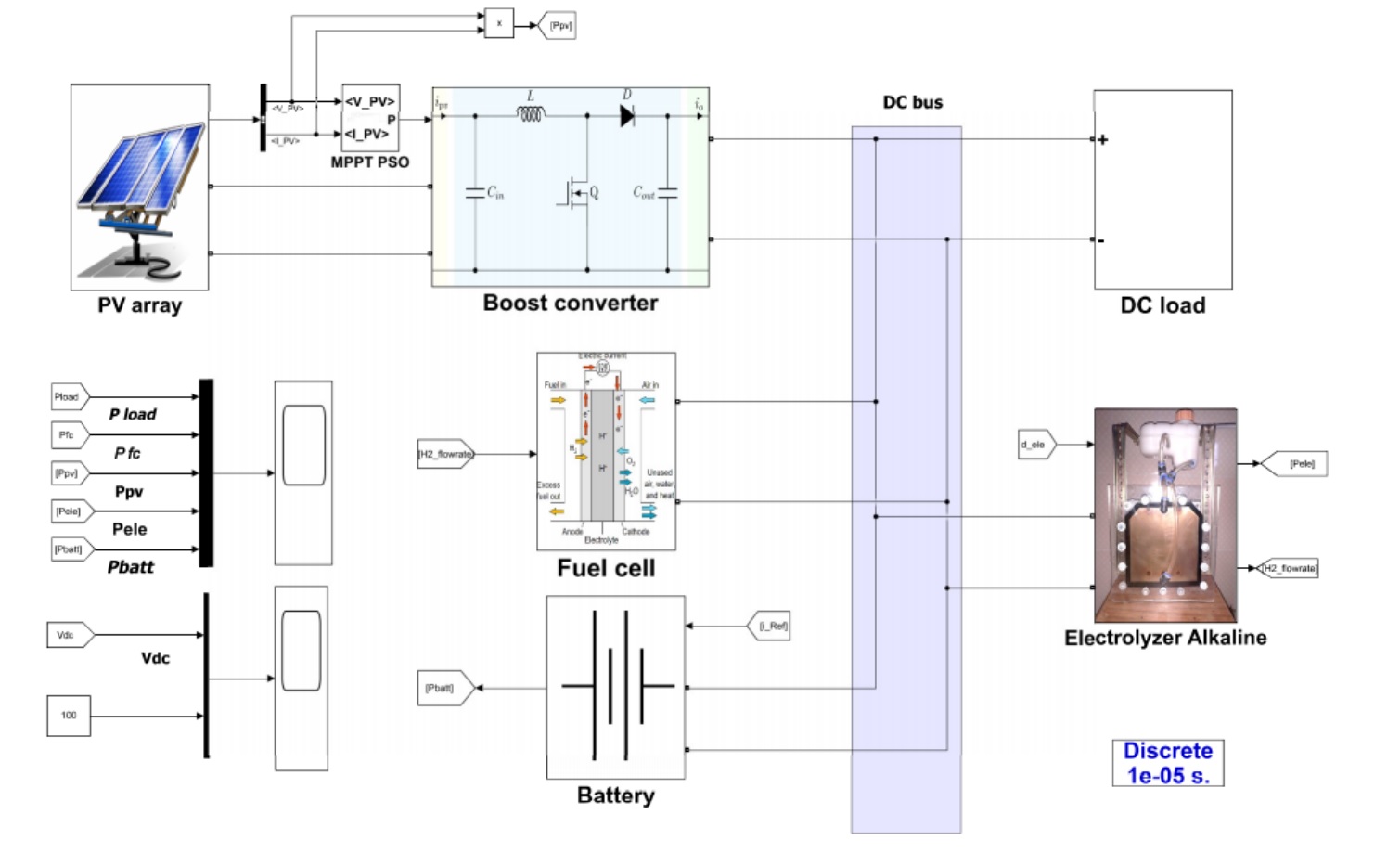Energy Management Strategy for PV PSO MPPT / Fuel Cell/Battery Hybrid System with Hydrogen Production and Storage
DOI:
https://doi.org/10.51173/jt.v5i3.890Keywords:
Alkaline Electrolyzer, Energy Management System (EMS), Hybrid Power System (HPS), Fuel Cell, PSO MPPTAbstract
Due to the high uncertainty of renewable energy sources, and the diversity of energy sources and storage systems, it is mandatory to seek a controller that manages all these renewable energy sources and this hybrid energy storage. This paper proposed a renewable energy management system using flatness control and PID and PSO technologies that track the maximum power point from the PV array and manages the energy storage elements. Two energy storage are adopted: battery storage and hydrogen tank. The proposed (Nero-fuzzy) controller also works to fill the hydrogen storage tank wisely and safely by controlling the alkaline electrolyzer and the tank's pressure. The main aim of this combined system is to attain power stability. Since the PV is the primary production source, a PSO MPPT is a proposed system for optimum power delivered by the PV under different radiation and temperature conditions. The fuel cell has been used to compensate for the energy lost when there is a lack of control due to weather conditions or high-power demand by the DC load. A battery was coupled to the DC bus to respond quickly to the power requirement. When the radiation intensity is 1000 W/m2, the PV will generate enough 18 kW to supply the load, run the electrolyzer 7 kW, and charge the batteries. While in the radiation change, when it is 240 W/m2, the solar panels produce (4.3 kW) and the load (4.7 kW). The battery works first because of its quick response, and then the fuel cell works to generate instead of it, which is sufficient to operate the load only. The results show a stable and fast response grid under different weather conditions and load scenarios.
Downloads
References
B. Ceran, "The concept of use of PV/WT/FC hybrid power generation system for smoothing the energy profile of the consumer," energy, vol. 167, pp. 853-865, 2019.
[S. S. Raghuwanshi and R. Arya, "Reliability evaluation of stand-alone hybrid photovoltaic energy system for rural healthcare centre," Sustainable Energy Technologies and Assessments, vol. 37, p. 100624, 2020.
S. A. N'guessan, K. S. Agbli, S. Fofana, and D. Hissel, "Optimal sizing of a wind, fuel cell, electrolyzer, battery, and supercapacitor system for off-grid applications," International Journal of Hydrogen Energy, vol. 45, no. 8, pp. 5512-5525, 2020.
H. Kraiem et al., "Increasing electric vehicle autonomy using a photovoltaic system controlled by particle swarm optimization," IEEE Access, vol. 9, pp. 72040-72054, 2021.
M. Rezaei, U. Dampage, B. K. Das, O. Nasif, P. F. Borowski, and M. A. Mohamed, "Investigating the impact of economic uncertainty on optimal sizing of grid-independent hybrid renewable energy systems," Processes, vol. 9, no. 8, p. 1468, 2021.
T. Salameh, M. A. Abdelkareem, A. Olabi, E. T. Sayed, M. Al-Chaderchi, and H. Rezk, "Integrated standalone hybrid solar PV, fuel cell and diesel generator power system for battery or supercapacitor storage systems in Khorfakkan, United Arab Emirates," International Journal of Hydrogen Energy, vol. 46, no. 8, pp. 6014-6027, 2021.
S. Islam and R. Belmans, "Grid independent photovoltaic fuel-cell hybrid system: design and control strategy," KIEE International Transaction on Electrical Machinery and Energy Conversion Systems, vol. 5, no. 4, pp. 399-404, 2005.
T. Senjyu, T. Nakaji, K. Uezato, and T. Funabashi, "A hybrid power system using alternative energy facilities in isolated island," IEEE Transactions on energy conversion, vol. 20, no. 2, pp. 406-414, 2005.
T. F. El-Shater, M. N. Eskander, and M. T. El-Hagry, "Energy flow and management of a hybrid wind/PV/fuel cell generation system," International Journal of Sustainable Energy, vol. 25, no. 2, pp. 91-106, 2006.
H. De Battista, R. J. Mantz, and F. Garelli, "Power conditioning for a wind–hydrogen energy system," Journal of Power Sources, vol. 155, no. 2, pp. 478-486, 2006.
J. P. Torreglosa, F. Jurado, P. García, and L. M. Fernández, "Hybrid fuel cell and battery tramway control based on an equivalent consumption minimization strategy," Control Engineering Practice, vol. 19, no. 10, pp. 1182-1194, 2011.
S. Singh, P. Chauhan, and N. Singh, "Capacity optimization of grid connected solar/fuel cell energy system using hybrid ABC-PSO algorithm," International Journal of Hydrogen Energy, vol. 45, no. 16, pp. 10070-10088, 2020.
Q. Li, R. Li, Y. Pu, S. Li, C. Sun, and W. Chen, "Coordinated control of electric-hydrogen hybrid energy storage for multi-microgrid with fuel cell/electrolyzer/PV/battery," Journal of Energy Storage, vol. 42, p. 103110, 2021.
M. A. V. Rad, R. Ghasempour, P. Rahdan, S. Mousavi, and M. Arastounia, "Techno-economic analysis of a hybrid power system based on the cost-effective hydrogen production method for rural electrification, a case study in Iran," energy, vol. 190, p. 116421, 2020.
K. MS, S. Nattuthurai, B. Chokkalingam, and L. Mihet‐Popa, "Mitigation of circulating current with effective energy management in low‐power PV‐FC‐battery‐microgrid," International Transactions on Electrical Energy Systems, vol. 31, no. 6, p. e12899, 2021.
M. S. Mohammed, K. M. Al-Awasa, and H. D. Al-Majali, "Energy management and control in microgrid with hybrid energy storage systems by using PI and flatness theory," International Journal of Engineering Trends and Technology, vol. 69, no. 11, pp. 227-235, 2021.

Downloads
Published
How to Cite
Issue
Section
License
Copyright (c) 2023 Faris Nasser Shaker, Adel A. Obed, Ahmed J. Abid, Ameer L. Saleh, Reheel J. Hassoon

This work is licensed under a Creative Commons Attribution 4.0 International License.
















